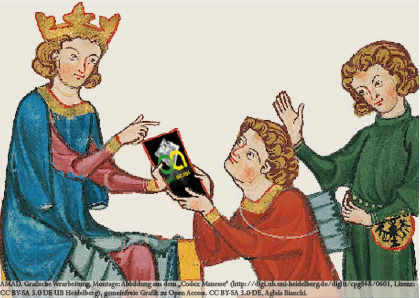AMAD
"Archivum Medii Aevi Digitale - Specialized open access repository for research in the middle ages"To submission

Full metadata record
| DC Field | Value | Language |
|---|---|---|
| Author | Dietmar Willoweit | - |
| Date | 2009 | - |
| Other Identifier | https://doi.org/10.12946/rg14/014-039 | - |
| Other Identifier | https://doaj.org/article/aa4b10f7881044938e04e8b3316b1cc6 | - |
| URI | https://www.amad.org/jspui/handle/123456789/65566 | - |
| Description | Generalising doctrines of a »criminal legal historical« character on act and delinquent only very inadequately capture medieval objectives and forms in the way wrongs were handled, since punishment in the legal life of society was only one of several possible reactions towards wrongdoing. Occasionally, individual acts of revenge were accepted. Threats of punishment did not necessarily lead to actual punishment in individual cases since the principle of legality, mandatory for the prosecution of offences, was unknown and punishments could be redeemed by financial settlement or even by labour. Moreover, in addition to punishment, restitution by the offender through an agreement to compensate, as well as public penance, especially in serious cases of homicide, played a leading role. This flexibility of legal practice suggests that an examination of the history of the penitentiary and other forms of conflict resolution in medieval times by means of a differentiating consideration of sanctions would be rewarding. To this end, recent scholarship has gathered a rich fund of material, both by a comparative analysis of normative texts and especially by studies of legal reality in particular places. On this basis, certain developments are noticeable: Roman and Christian influence in early medieval times, a policy since the 12th century to keep the public peace, Roman paradigms and the formation of dogmatism in criminal law in the late Middle Ages. If nothing else, the diversity of sanctions – in contrast to common prejudice – shows quite clearly that elements of guilt were taken into account in the run-up to proceedings, proving not least the actual, although not dogmatic, differentiation between homicide and murder. | - |
| Language | ita | - |
| Language | por | - |
| Language | ger | - |
| Language | eng | - |
| Language | spa | - |
| Language | fre | - |
| Keywords | Political science | - |
| Keywords | Law | - |
| Dewey Decimal Classification | 940 | - |
| Title | Entdogmatisierung der mittelalterlichen Strafrechtsgeschichte | - |
| Type | article | - |
| AMAD ID | 534052 | - |
| Year | 2009 | - |
| Open Access | 1 | - |
| Discipline | Rechtswissenschaft | - |
| Appears in Collections: | BASE (Bielefeld Academic Search Engine) General history of Europe | |
Files in This Item:
There are no files associated with this item.
Items in DSpace are protected by copyright, with all rights reserved, unless otherwise indicated.

